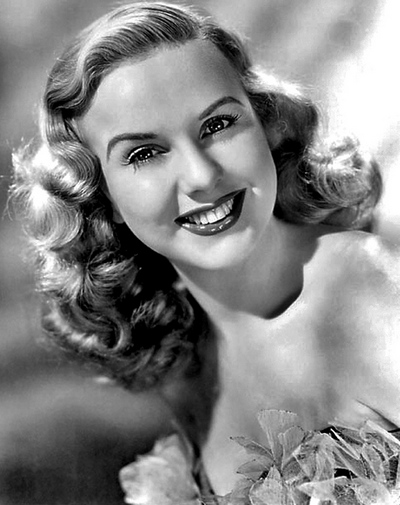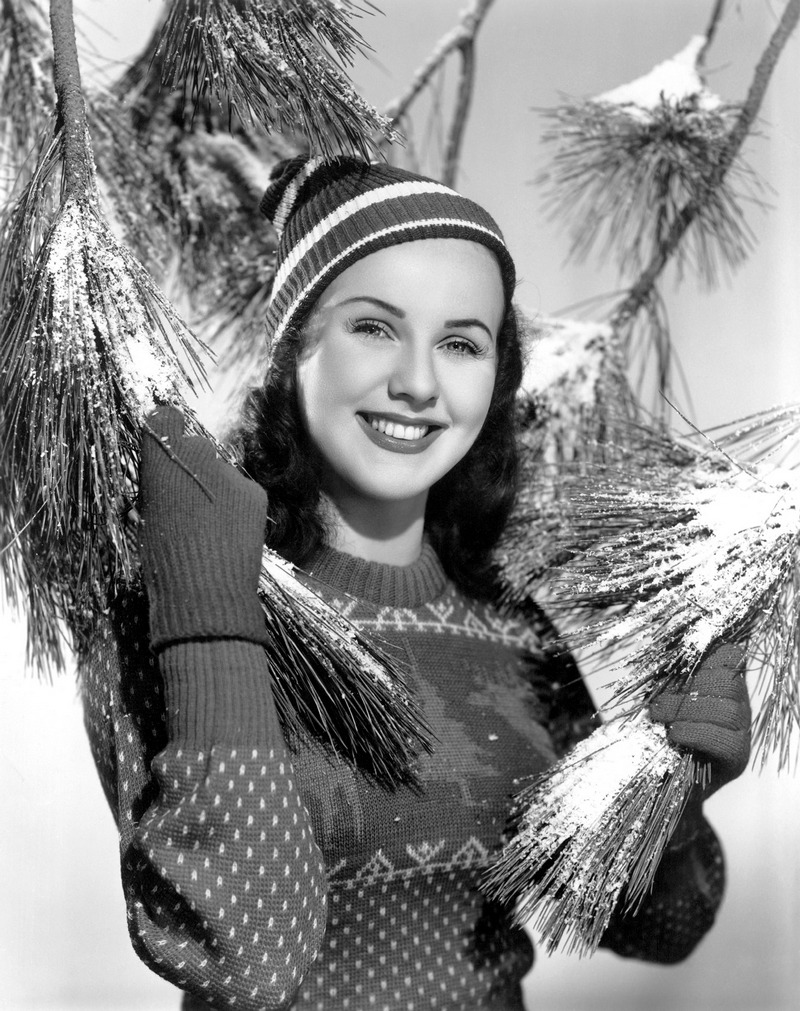Deanna Durbin (Deanna Durbin)

Edna Mae Durbin was born on December 4, 1921 at Grace Hospital in Winnipeg, Manitoba, Canada, the daughter of James Allen Durbin and his wife Ada (née Read), who were originally from Manchester, England. In 1923, her family moved from Winnipeg to southern California, and her parents soon become United States citizens. At the age of one, Edna Mae was singing children’s songs. By the time she was ten, her parents recognized that she had definite talent and enrolled her in voice lessons at the Ralph Thomas Academy. Durbin soon became Thomas’ prize pupil, and he showcased her talent at various local clubs and churches.
In early 1935, Metro-Goldwyn-Mayer was planning a biographical film on the life of opera star Ernestine Schumann-Heink and were having difficulty finding an actress to play the young opera singer. MGM casting director Rufus LeMaire heard about a talented young soloist performing with the Ralph Thomas Academy, and called her in for an audition. Durbin sang “Il Bianco” for the studio’s vocal coach who was stunned by her “mature soprano” voice. She sang the number again for Louis B. Mayer who signed her to a six-month contract. Durbin made her first film appearance in a short subject, Every Sunday (1936), with another young contract player, Judy Garland. The film served as an extended screen test for the pair as studio executives were questioning the wisdom of having two female singers on the roster. Ultimately Louis B. Mayer decided that both girls would be kept, but by the time that decision was made, Durbin’s contract option had elapsed.
Durbin was quickly signed to a contract with Universal Studios, where she was given the professional name Deanna. She was 14 years old when she made her first feature-length film, Three Smart Girls (1936). When producer Joe Pasternak was casting the film, he wanted to borrow Garland from MGM, but Garland was not available at the time. When Pasternak learned that Durbin was no longer with MGM, he cast her in the film instead. Three Smart Girls was an immediate success and established Durbin as a star. With Pasternak producing for Universal, Durbin went on to star in a string of successful musical films, including One Hundred Men and a Girl (1937), Mad About Music (1938), That Certain Age (1938), Three Smart Girls Grow Up (1939), and First Love (1939)—most of which were directed by Henry Koster.
During the 1930s, Durbin continued to pursue singing projects. In 1936, she auditioned to provide the vocals for Snow White in Disney’s animated film Snow White and the Seven Dwarfs, but was ultimately rejected by Walt Disney, who declared the 15-year-old Durbin’s voice “too old” for the part. In late 1936, Cesar Sturani, the General Music Secretary of the Metropolitan Opera, offered Durbin an audition. She turned down his request because she felt she needed more singing lessons. Andrés de Segurola, who was the vocal coach working with Universal Studios—and himself a former Metropolitan Opera singer—believed that Durbin had an excellent opportunity to become an opera star. De Segurola had been commissioned by the Metropolitan Opera to watch her progress carefully and keep them advised. Also in 1936, Durbin started a collaboration with Eddie Cantor, which lasted until 1938 when her heavy workload for Universal forced her to discontinue her weekly radio show appearances.
In the early 1940s, Durbin continued her string of successful films with It’s a Date (1940), Spring Parade (1940), Nice Girl? (1941), and It Started with Eve (1941), her last film with Pasternak and director Henry Koster. After Pasternak moved from Universal to MGM, Durbin went on suspension between October 16, 1941 and early February 1942 for refusing to appear in They Lived Alone, scheduled to be directed by Koster. Ultimately, the project was canceled when Durbin and Universal settled their differences. In the agreement, Universal conceded to Durbin the approval of her directors, stories and songs.
Following the two sequels to her first film Three Smart Girls, Durbin issued a press release announcing that she was no longer inclined to participate in these team efforts and was now performing as a solo artist. The Three Smart Girls Join Up title was changed to Hers to Hold (1943). Joseph Cotten, who played alongside Durbin in the film, praised her integrity and character in his autobiography. Also in 1943, Durbin took on a more sophisticated role in the World War II story of refugee children from China, The Amazing Mrs. Holliday, directed in part by Jean Renoir, who left the project before its completion. Additional adult roles followed, including the film noir Christmas Holiday (1944), directed by Robert Siodmak, and the whodunit Lady on a Train (1945).
While these adult dramatic roles may have been more satisfying for Durbin, her substantial fan base preferred her in light musical confections, such as Can’t Help Singing (1944), her only Technicolor film, which features some of the last melodies written by Jerome Kern plus lyrics by E. Y. Harburg. A musical comedy in a Western setting, this production was filmed mostly on location in southern Utah and co-starred Robert Paige.
In 1946, Universal merged with two other companies to create Universal-International. The new regime discontinued much of Universal’s familiar product and scheduled only a few musicals. Durbin stayed on for another four pictures: I’ll Be Yours (1947), Something in the Wind (1947), Up in Central Park (1948), and For the Love of Mary (1948). In 1946, Durban was the second highest paid woman in the United States, just behind Bette Davis, and in 1947 she was the top-salaried woman in the United States. Her fan club ranked as the world’s largest during her active years. By 1948, however, her box-office clout began to diminish. In private life, Durbin continued to use her given name; salary figures printed annually by the Hollywood trade publications listed the actress as “Edna Mae Durbin, player”.
On August 22, 1948, two months after completing her final film, Universal-International announced a lawsuit which sought to collect from Durbin $87,083 in wages the studio had paid her in advance. Durbin settled the complaint amicably by agreeing to star in three more pictures, including one to be shot on location in Paris. Ultimately, the studio would allow Deanna’s contract to expire on August 31, 1949, so the three films were never made. Durbin, who obtained a $200,000 ($1,982,378 as of 2014), severance payment chose at this point to retire from movies. Her former producer Joe Pasternak tried to dissuade her, but she told him: “I can’t run around being a Little Miss Fix-It who bursts into song—the highest-paid star with the poorest material.” Durbin had already turned down Bing Crosby’s request for her to appear in two of his projects for Paramount Pictures, Top o’ the Morning and A Connecticut Yankee in King Arthur’s Court.
Durbin married an assistant director, Vaughn Paul, in 1941; the couple divorced in 1943. Her second marriage, to film writer-producer-actor Felix Jackson in 1945, produced a daughter, Jessica Louise Jackson, but a divorce followed in 1949. In Paris on December 21, 1950, shortly after her 29th birthday, Deanna Durbin married Charles David, the producer-director of both French and American pictures who had guided her through Lady on a Train (1945). Durbin and David raised two children: Jessica (from her second marriage to Felix Jackson) and Peter (from her union with David). Over the years, Durbin resisted numerous offers to perform again, including MGM’s offer to appear in the film versions of Cole Porter’s Kiss Me Kate (1953) and Sigmund Romberg’s operetta The Student Prince (1954). In 1951, Durbin was invited to play in London’s West End production of Kiss Me Kate, and was reportedly Alan Jay Lerner’s first choice to portray Eliza Doolittle in the 1956 Broadway cast of My Fair Lady. Suggestions that Durbin sing at major Las Vegas casinos also went unfulfilled.
In 1983, film historian David Shipman was granted a rare interview by Durbin. In the interview, she steadfastly asserted her right to privacy and maintained it until the end of her life, declining to be profiled on websites. Durbin made it known that she did not like the Hollywood studio system. She emphasized that she never identified herself with the public image that the media created around her. She spoke of the Deanna “persona” in the third person, and considered the film character “Deanna Durbin” to be a by-product of her youth and not her true identity.
Durbin’s husband of more than 48 years, Charles David, died in Paris on March 1, 1999. On April 30, 2013, a newsletter published by the Deanna Durbin Society reported that Durbin died “in the past few days”, quoting her son, Peter H. David, who thanked her admirers for respecting her privacy. No other details were given. According to a family friend, Durbin died on or about April 20 in Neauphle-le-Château, France.
Born
- December, 04, 1921
- Winnipeg, Canada
Died
- April, 20, 2013
- Neauphle-le-Château, France




